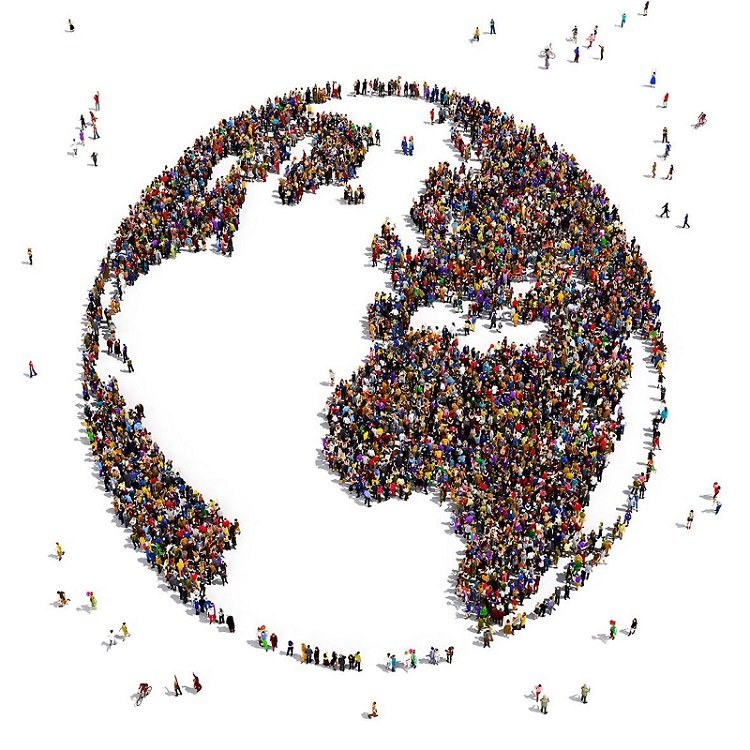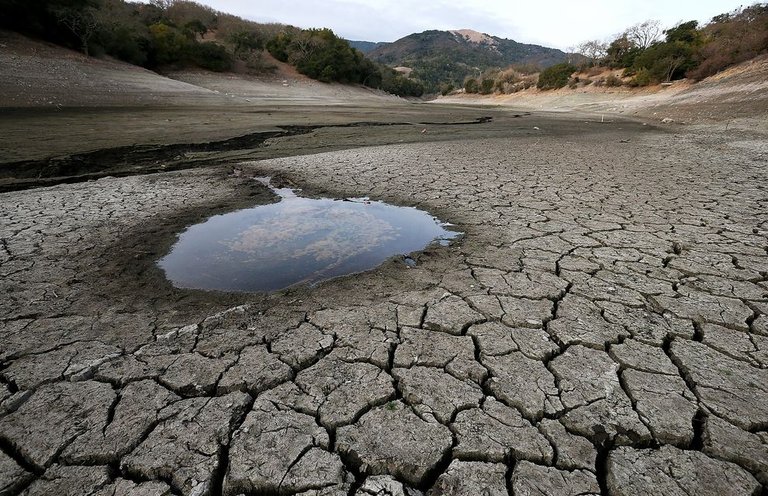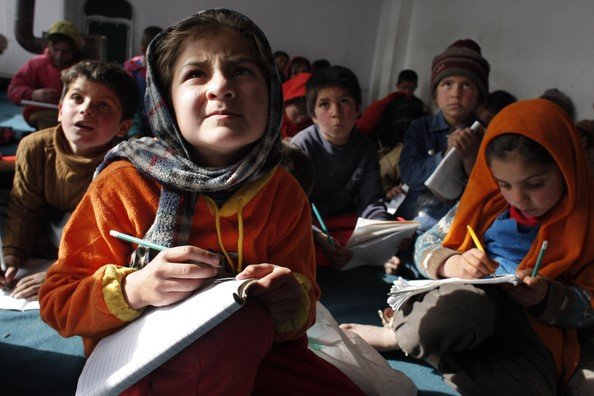Overpopulation is simply a scenario where a species population surpasses the capacity of their immediate ecological niche. This can happen as a result of several reasons such as a decline in mortality (death rate), an increase in fertility (birth rate), an increase in immigration and several others.
Human overpopulation is a global topic that has been heavily debated since humanity grew to 1 billion. It took humanity 50,000 years to go from 0 to 1 billion people, and it only took about 200 years to go from 1 billion to 7 billion people. As the diagram below shows, for the past 50 years, it takes humanity a lesser time to add a billion to its existing population
According to this source 4 births occur in every second of the day, whereas only 2 deaths occur within the same timeframe. This implies that in every second, an additional 2 people join our ever-growing population; which translate to about 200,000 people daily. What can be done about this?
In this post, we will be looking at overpopulation as it relates to humans, and their immediate environment, the effects of overpopulation and the possible solution to solving this challenge. In the end, we as individuals have a role to play that will directly impact the survival of our own species on the long haul.
There are going to be two major talking points
- The Problem
- Possible solutions
The Problem
We cannot deny the fact that human overpopulation is one of the top pressing environmental challenges directly affecting environmental pollution, global warming, animal extinction, the high consumption of finite natural resources such as fossil fuel and fresh water etc.
These are the major challenges that overpopulation presents
- Fresh Water Depletion
Data from UN-Water suggests that 75% of the earth is comprised of water. About 97.5% of the said sum makes up the ocean and freshwater can account for only 2.5%. Interestingly, 70% of the available freshwater are distributed and can be found in ice caps and glaciers, and the outstanding 30% is what is obtainable in land surfaces such as lakes, ponds, rivers and groundwater.
A vast amount of the freshwater resources are either too polluted or unreachable, leaving just below 1% of the world's freshwater. The percentage of earth's fresh water available to man is 0.003%.
It is estimated that by 2025, a fraction of the world's human population will lack access to fresh water. Hence another challenge for humanity to confront, as the basic necessities needed to survive becomes scarce.
- Species Extinction
Humans are currently driving a massive extinction of the planet's plants and animal species. The updated list of threatened species released by the IUCN in 2012 reveals that the 63,837 globally examined species, 19,817 of these species are threatened with going extinct. This translate to one-third of total number of species on the planet is facing extinction.
If this trend doesn't change, in a few decade's time, half of the world's plants and animals will cease to exist, this will directly be as a result of habitat loss, climate change, acidifying, poaching, over-exploitation, and yes - human overpopulation.
- Lower Quality of Life
Based on a study by Harvard University, ""Within the next forty years, 97% of the 2.3 billion projected increase in people, will be from less developed parts of the world, Africa will be responsible for 49% of that figure".
Developing nations in Southern Asia, Sub Sahara Africa, which are currently experiencing explosive population growth, will be faced with a major degradation of quality and longevity of life. These regions will be faced with difficulties such as access to clean water supply, housing to their ever-growing populations, food, security, public health.
Uganda, Bangladesh and Nigeria will be heavily hit with this reality, as their population will double, and in some cases even triple over the next 40 years.
- Natural Resources Depletion
With the explosive growth of the human population, natural resources such as fresh water, fossil fuels, frontier forests and coral reefs will continue to plunge which in turn will place a high-stress level on the basic resources required to sustaining life. This will translate to a reduced quality of life
- Climate Change
Reports from the Center for Biological Diversity, "The single largest threat biodiversity and ecology of planet earth faces in the foreseeable future will be the disruption of global climate as a result of greenhouse gases generated by human builds up in the atmosphere. Despite humans best efforts of minimizing their carbon footprint by means of better technology and reduced consumption.
But this may be undone by the ever-growing human population, which may lead to a conclusion that smaller footprints won't be enough, but the planet desperately needs fewer feet. The major science academy around the world has come to that conclusion.
- Surge in Crime Rate
As humanity's population surges, this creates a high demand for resources, basic necessities like food, clean water, among others will become scarce. This demand will influence competitiveness for the available resources which in turn will see the increase in crime rates; there will be an increase in theft, drug cartels, as people will seek every available means to survive.
Aisha Tariq of Pakistan Times states "It has been observed that the countries which have balanced population, the crime rate is very low in such regions". When humans are deprived of the basic necessities, crime rates go up.
- Epidemic and Pandemics
According to a WHO report environmental degradation together with the exponential increase of the world's population, combined, are responsible for the rapid increase in human diseases. This gives result to 3.7 billion hungry people worldwide, who are highly susceptible to diseases.
A young child dies of infectious disease every 3 seconds, and in some countries, one in five child dies before they turn 5. Of the 3000 people that die from malaria everyday, 3 out of 4 of them are children. Tuberclosis kills a staggering 1.5 million annually, and 8 million also get infected by the disease recently.
Overpopulation aggravate environmental and social conditions, such as living in crowded conditions, malnutrition, pollution and inadequate health care. The poor suffers directly as a result because they are the most exposed to infectious diseases.
Possible Solutions
- Education
One of the most viable ways of curbing the increase of human footprints on the planet is by education, if people understand the dangerous impact of overpopulations as it regards the survival of humanity; necessary adjustments will be made and humanity will survive. In recent times, the world popualtion growth has slightly reduced from 1.3% annual growth down to 1.1% annuale growth, and scientist attributed this change to education.
- Female Education
It has been revealed that women with jobs are more likely to make use of birth control also, women that break out of poverty, usually have access to reproductive health services. Initiatives such as microcredit projects have been put in place by the United Nations to empower women in developing countries to advocate for reproductive health. The importance of educating women in developing nations is crucial in curbing overpopulation.
- Family Planning
The promotion of family planning is an effective way to go about solving the challenge of overpopulation. Educating both men and woman about the need to use contraceptive can have an enormous impact. In 1989, Iran launched a national programme aimed at family planning, this cut fertility rate from 5.6 births per woman to 2.6 within a decade. The same effort in Rwanda saw the use of contraceptive triple within 5 years.
- Government Policies
We can't talk about efforts of curbing the world's population without mentioning China's one-child policy. Despite the controversies, the results were outstanding. From 1960 to 2014, fertility drastically reduced from six births per woman to 1.5. Government has a major role to play in creating policies, and educating its citizens
- Colonizing of Mars
There is the discussion of man being a multi-planet species, this in may be is the future of humanity as it represents a possible solution to man's overpopulation of the planet, and a frontier of man's evolution as the most evoved specie. Although Interstellar expeditions are expensive, and highly risky with no guarantee of success, but it seems to be a viable solution. This can be indicated by the heavy involvement of Paypal billionaire Elon Musk who founded SpaceX with the single purpose of reducing the cost of transportation in space, and enabling the colonization of Mars.
As of this moment, Mars doesn't support human life. The air pressure is 1% when compared to that of Earth, and the mean temperature is -55 (degre celcius) the planet environment can only be described as hostile. But we have seen here on earth, humans can have an impact on a planet. We can change the planet, making it a good and pleasant place to be; but in order to do this, we need to understand the way the planet reacts to our activites.
Mars is about 1.5 times as far from the Sun as Earth, and half the size of earth. The gravity is 38% of earth experiences. One day takes 24 hours, and 37 minutes and a year is 687 days long, and its season is not too different from that of the Earth. To successfully colonize Mars, we have to understand what these impacts will have on Man. Man has to device a means to survive Mars hostile environment.
Conclusion
On a granular level, there are little actions we can take that will positively impact our little blue planet. Actions like turning off a bulb when not in use, adopting a child or a pet and several other little actions can help save the planet in the end.
References











You finally made this post and its quite elaborate.
Nice one bro.. Resteemed!
Thanks man...it took me some time, but I had to make it.
I think over population is not the actual problem, I think it’s land management what is actually wrong with this world. I’ve literally spent hours and hours looking at miles and miles of unoccupied land so what I actually believe that people are poor at managing land.
I bet many other civilizations have lived before us and I’m sure none of them would have ever complaint about over population.
You have a good point.
But the problem is the resources needed to support one human being. If they should cramp all 7.2 billion people currently walking the planent together in one place, we will merely fill California.
Earth can only accommodate 4 billion people, anything more than that figure is going to result to massive environmental changes, changes that we are already experiencing.
So, land management is an issue, but overpopulation is a bigger issue. Because if nothing is done about our explosive population growth, we will need more housing to accommodate the growing population, meaning more deforestation. And when we finally get rid of all the planets on the planet, another problem will be oxygen.
There is billions of bacteria fungus and what not is living on this planet, many many plants and trees, birds, dogs, wild beasts, lion, tiger, hyenas, ants, monkeys, pigs, well you got the idea. None of them is building concrete jungle, none of them is consuming the resources to deplete them. Human species have grown into something madning and they’re still pursuing it. We have forgoton our base nature but wasn’t that the main idea? We made a mistake in the past and now we don’t know what to do, none of us that’s why we choose to blame each other and go on with same old ways.
If that is our attitude now there will be a day when we will all destroy not just the earth but the whole freaking Universe in the name of advancement and growth.
Scientist joke around how aliens hates us for this same reason, aliens are not the demons we are the demons. We need to learn how to utilize our resources and still manage to grow without causing permanent damage to the earth. We don’t need to freaking blame and fight we just need to slow down and change our ways in a way we don’t destroy the whole world just to feed never ending lust for materialism.
I’m sorry for writing too much but there is no other way out, it’s just illusion.
You're absolutely right.
We just need to find a solution for slowing down the rate at which we procreate and minimalistic way of consuming earth's finite resources. Until we do this, the whole universe is at risk because of man.
This is an extremely important topic for discussion and global comprehension. I know that I plan in doing my part of being part of the solution by not procreating with my partner. Aside from personal views, it is hard to ignore the strain that is being placed upon all of the ecosystems of life by this explosion of births. It is extremely nearsighted to claim that we are not determining a future of greater hardship with such reckless behavior.
While it may not be a popular one, I identify religion as a serious proponent of the drive to create. Religions teach of predeterminism, that you got pregnant because you were supposed to, so that there would be another "soul" to raise within the faith. This is by design so the faith does not become obsolete due to people finding reason through education, but instead rejecting any evidence that cotradicts in the "belief". Among the economic and moral decay that religion supports, religion will actively fight reason to allow us to cripple out future generations.
You're absolutely right!
Religion and cultural believe play a major role in overpopulation. Here in Nigeria, the Muslims literally take the words 'Populate the Earth' seriously. The men marry a minimum of two wives and there children are in tens. These people live in abject poverty, with no health care or education.
Similarly, it's a cultural believe that one's you of a certain age in Nigeria, (say late twenties or thirties) you ought to be married, and once you're married you need to have children.
The society frowns at people that chooses to do otherwise.
I believe similar cultural and religious system prevails in other developing countries with spiking population growth (Sub Saharan Africa and Southern Asia)
I totally agree with you, that religion and culture are major drivers to overpopulation.
STEEM WitnessYou got a 0.47% upvote from @upme requested by: @agbona. Send at least 1.5 SBD to @upme with a post link in the memo field to receive upvote next round. To support our activity, please vote for my master @suggeelson, as a
Peace, Abundance, and Liberty Network (PALnet) Discord Channel. It's a completely public and open space to all members of the Steemit community who voluntarily choose to be there.Congratulations! This post has been upvoted from the communal account, @minnowsupport, by agbona from the Minnow Support Project. It's a witness project run by aggroed, ausbitbank, teamsteem, theprophet0, someguy123, neoxian, followbtcnews/crimsonclad, and netuoso. The goal is to help Steemit grow by supporting Minnows and creating a social network. Please find us in the
If you would like to delegate to the Minnow Support Project you can do so by clicking on the following links: 50SP, 100SP, 250SP, 500SP, 1000SP, 5000SP. Be sure to leave at least 50SP undelegated on your account.
Hhhhhmmmm..... Interesting.
But we humans are our own enemies. We cause all these changes to escalate. In the natural, it would have taken forever
I won't say humans are human's enemies, but I'll say the uneducated and poor humans that procreate on a massive scale, are the true enemies of humanity.
Too many people create a high demand for basic life resources, and that's a problem, a big problem.
So true! And the effects are beginning to show. God help us
Yeah.
The effects are showing. About God helping us, I'll like to see how it happens.